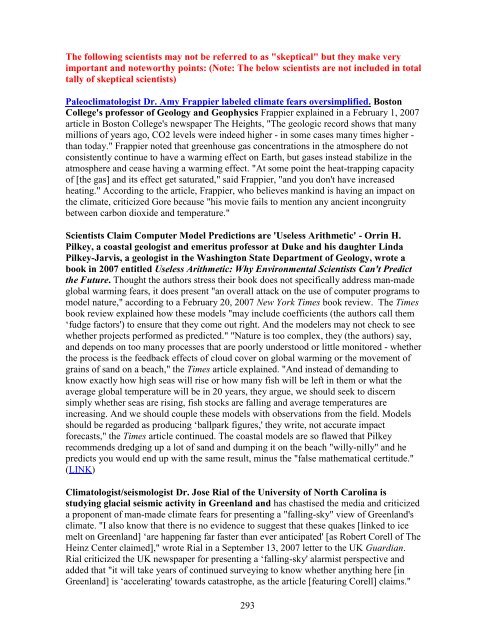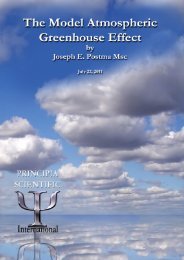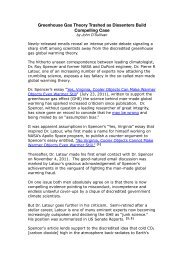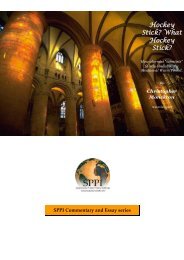Than 1000 International Scientists Dissent Over Man-Made Global ...
Than 1000 International Scientists Dissent Over Man-Made Global ...
Than 1000 International Scientists Dissent Over Man-Made Global ...
Create successful ePaper yourself
Turn your PDF publications into a flip-book with our unique Google optimized e-Paper software.
The following scientists may not be referred to as "skeptical" but they make very<br />
important and noteworthy points: (Note: The below scientists are not included in total<br />
tally of skeptical scientists)<br />
Paleoclimatologist Dr. Amy Frappier labeled climate fears oversimplified. Boston<br />
College's professor of Geology and Geophysics Frappier explained in a February 1, 2007<br />
article in Boston College's newspaper The Heights, "The geologic record shows that many<br />
millions of years ago, CO2 levels were indeed higher - in some cases many times higher -<br />
than today." Frappier noted that greenhouse gas concentrations in the atmosphere do not<br />
consistently continue to have a warming effect on Earth, but gases instead stabilize in the<br />
atmosphere and cease having a warming effect. "At some point the heat-trapping capacity<br />
of [the gas] and its effect get saturated," said Frappier, "and you don't have increased<br />
heating." According to the article, Frappier, who believes mankind is having an impact on<br />
the climate, criticized Gore because "his movie fails to mention any ancient incongruity<br />
between carbon dioxide and temperature."<br />
<strong>Scientists</strong> Claim Computer Model Predictions are 'Useless Arithmetic' - Orrin H.<br />
Pilkey, a coastal geologist and emeritus professor at Duke and his daughter Linda<br />
Pilkey-Jarvis, a geologist in the Washington State Department of Geology, wrote a<br />
book in 2007 entitled Useless Arithmetic: Why Environmental <strong>Scientists</strong> Can't Predict<br />
the Future. Thought the authors stress their book does not specifically address man-made<br />
global warming fears, it does present "an overall attack on the use of computer programs to<br />
model nature," according to a February 20, 2007 New York Times book review. The Times<br />
book review explained how these models "may include coefficients (the authors call them<br />
‗fudge factors') to ensure that they come out right. And the modelers may not check to see<br />
whether projects performed as predicted." "Nature is too complex, they (the authors) say,<br />
and depends on too many processes that are poorly understood or little monitored - whether<br />
the process is the feedback effects of cloud cover on global warming or the movement of<br />
grains of sand on a beach," the Times article explained. "And instead of demanding to<br />
know exactly how high seas will rise or how many fish will be left in them or what the<br />
average global temperature will be in 20 years, they argue, we should seek to discern<br />
simply whether seas are rising, fish stocks are falling and average temperatures are<br />
increasing. And we should couple these models with observations from the field. Models<br />
should be regarded as producing ‗ballpark figures,' they write, not accurate impact<br />
forecasts," the Times article continued. The coastal models are so flawed that Pilkey<br />
recommends dredging up a lot of sand and dumping it on the beach "willy-nilly" and he<br />
predicts you would end up with the same result, minus the "false mathematical certitude."<br />
(LINK)<br />
Climatologist/seismologist Dr. Jose Rial of the University of North Carolina is<br />
studying glacial seismic activity in Greenland and has chastised the media and criticized<br />
a proponent of man-made climate fears for presenting a "falling-sky" view of Greenland's<br />
climate. "I also know that there is no evidence to suggest that these quakes [linked to ice<br />
melt on Greenland] ‗are happening far faster than ever anticipated' [as Robert Corell of The<br />
Heinz Center claimed]," wrote Rial in a September 13, 2007 letter to the UK Guardian.<br />
Rial criticized the UK newspaper for presenting a ‗falling-sky' alarmist perspective and<br />
added that "it will take years of continued surveying to know whether anything here [in<br />
Greenland] is ‗accelerating' towards catastrophe, as the article [featuring Corell] claims."<br />
293





